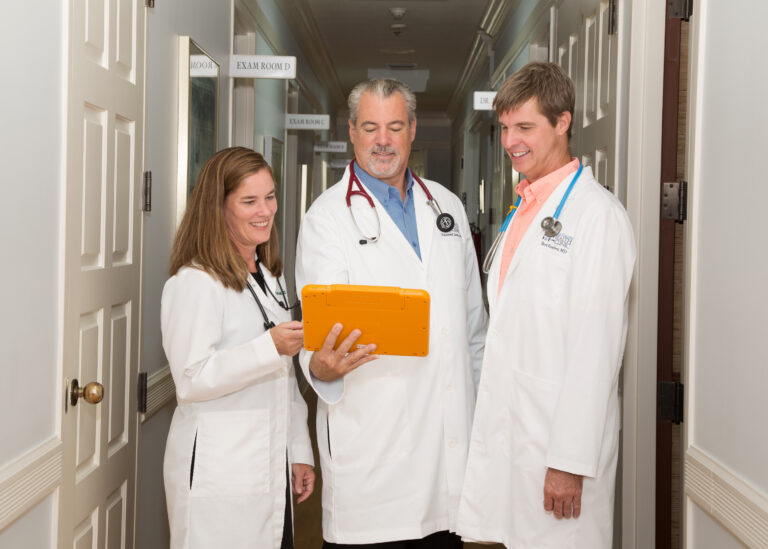
Florida is First . . . in COVID-19 Cases: The Delta variant now on island

The Delta variant of the coronavirus has arrived on island with the Clinic seeing an uptick in COVID-19 cases this past week including symptomatic infections in those fully vaccinated.
The Centers for Disease Control and Prevention (CDC) put forth new face mask guidelines in response to surging COVID-19 cases across the nation. Florida is leading the nation in new cases as well as hospitalizations for COVID-19. On July 30, Florida logged a record number of 21,683 new cases; the highest number of daily cases since the pandemic began. The current statewide average new case positivity is 18 percent – the highest since the beginning of the pandemic.
New CDC guidance for the fully vaccinated also now recommends testing 3-5 days after exposure and wearing a mask in public for 14 days after exposure. The guidance to isolate for 10 days from the start of symptoms or a positive test as well as contact tracing protocols continue to be recommended for fully vaccinated individuals that test positive.

Understanding the Delta variant
- First identified in in India in December 2019 and spread rapidly through that country and into other countries. The World Health Organization says it’s already spread to at least 80 countries. In the United States, the first Delta variant case was identified in March.
- The Delta variant is more contagious and spreads much faster than other COVID-19 strains.
- The Delta variant’s genetic makeup makes it easier for the spike protein to bind to human cells and helps the virus evade antibodies.
- There’s more to learn about this variant. A study from Scotland showed the Delta variant was about twice as likely as Alpha to result in hospitalization in unvaccinated individuals, but other data has shown no significant difference. We’re also just learning how the Delta affects the body. Recent surveys in the United Kingdom report that headache, sore throat, runny nose, and fever are present and symptoms like cough and loss of smell are less common. Locally, gastrointestinal symptoms like diarrhea are also more reported than in the past.
Why mask up again
- Because of the highly contagious nature of the Delta variant, health officials and scientists say that wearing a mask is once again a vital weapon in combating the spread. Delta is responsible for driving surges of COVID-19 in much of the country and now accounts for more than 80 percent of infections.
- New data shows that even vaccinated people can spread that virus to others.
- The Delta strain seems to be impacting younger age groups more than previous variants.
Who is at risk
- People who have not been fully vaccinated against COVID-19 are most at risk.
- Kids and young people. A recent study from the United Kingdom showed that children and adults under 50 were 2.5 times more likely to become infected with Delta. And so far, no vaccine has been approved for children 5 to 12 in the United States.
Vaccination offers protection
- Getting vaccinated prevents severe illness, hospitalizations, and death. With the Delta variant, this is more urgent than ever. The CDC recommends that unvaccinated people get vaccinated and continue masking until they are fully vaccinated.
- People fully vaccinated against the coronavirus appear to have protection against Delta, but anyone who is unvaccinated and not practicing preventive strategies is at risk for infection by the new variant.
- The big pharmaceutical companies with COVID-19 vaccines have reported on studies showing their vaccines are effective against Delta. The Pfizer-BioNTech vaccine was 88 percent effective against symptomatic disease and 96 percent effective against hospitalization from Delta, while Oxford-AstraZeneca (which is not an mRNA vaccine) was 60 percent effective against symptomatic disease and 93 percent effective against hospitalization. Moderna’s studies are not yet peer-reviewed, but the company says they show its vaccine to be effective against Delta and several other mutations. Johnson & Johnson also has reported that its vaccine is effective against Delta, but one recent study, which has not yet been peer-reviewed or published in a scientific journal, suggests that its vaccine is less effective against the variant, which has prompted discussion over whether a booster is needed. Locally though, we have seen breakthrough cases in people fully vaccinated with all three of the vaccines authorized in the United States. Full U.S. Food and Drug Administration approval of the vaccines or addendum to their emergency use authorizations will be needed to make official recommendations on any booster dosing.
The bottom line is that every infection counts as a chance for new variants to emerge and we all need to continue to do our part to help prevent the spread.
Experts tell us that conquering Delta is a race between vaccination rates and the variant’s speed of transmission. And if Delta keeps moving fast, infections will multiply exponentially, leading to a situation where healthcare resources are again overwhelmed. For many of us with grandchildren, this is especially concerning.
How you can help
- The most important thing you can do to protect yourself and others from Delta is to get fully vaccinated. That means the full two doses if getting the Pfizer or Moderna vaccine and then waiting the recommended two-week period for those shots to take full effect.
- Follow CDC prevention guidelines that are available for vaccinated and unvaccinated people, including the latest guidance on masks.
Resources
- CDC COVID-19 Integrated County View: Run a search by state or county and click around the color-coded map to see how active the virus is where you live.
- Florida has many sites that are providing COVID-19 vaccines, which remain free to eligible residents.
- CDC’s updated guidance for fully vaccinated people.
More Recent Healthcare News

Every year we celebrate Doctor’s Day and Nurses Week, but there’s one more recognition event that’s just as important. Administrative Professionals Day is April 24th this year and I want to be sure to bring special attention to three incredibly special members of the Boca Grande Health Clinic family. Jonna Foos, Director of Operations Jonna […]

April, the birth month of James Parkinson, is Parkinson’s Disease Awareness Month. Parkinson’s is a degenerative syndrome that results in the gradual loss of brain circuitry involved in movement, thinking and behavior. According to the National Institutes of Health (NIH), the first clear medical description of Parkinson’s Disease as a neurological condition was written in […]

March 30th marks a special day on our calendar – Doctor’s Day! It’s a time to honor those who dedicate their lives to caring for us. At the Boca Grande Health Clinic, it’s the extraordinary team of board-certified physicians – Dr. Raymond A. James, our Medical Director; Dr. Bret Kueber, the Assistant Medical Director; and […]

Ask a Doc: Kicking Colon Cancer in the Butt
March 22, 2024According to the American Cancer Society, the lifetime risk of developing colorectal cancer is about 1 in 23 for men and 1 in 25 for women. The death rate from colorectal cancer has been dropping in older adults for several decades. Unfortunately, colorectal cancers now rank as the leading cause of cancer death in men […]
